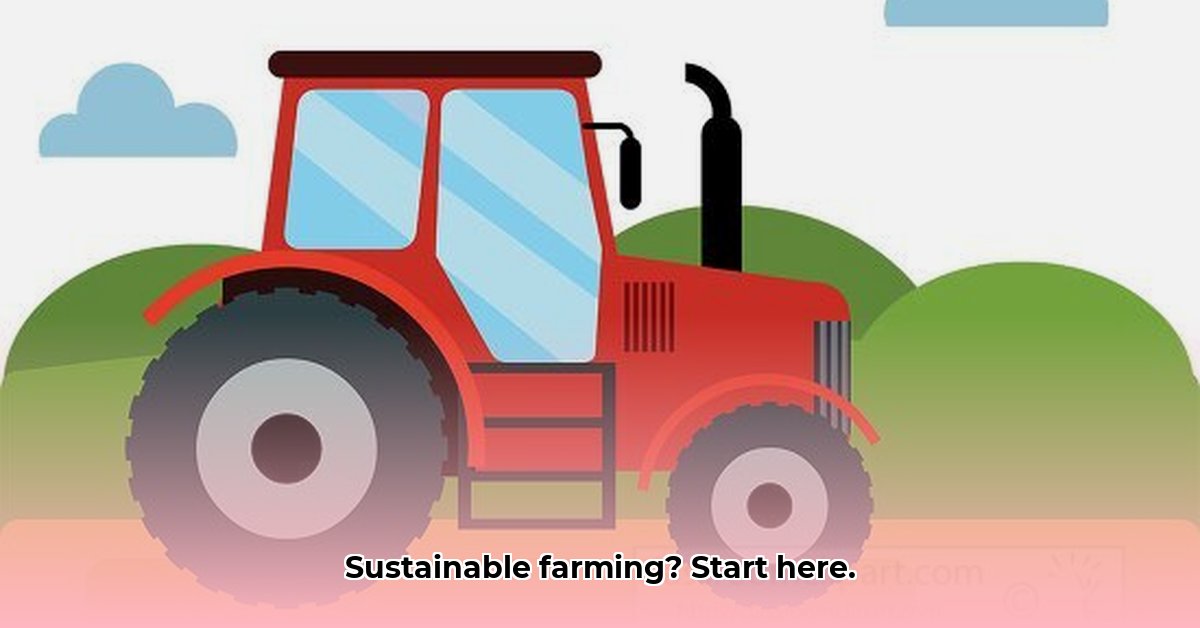
Choosing Sustainable Tractor Models: Investing in Efficiency and Longevity
Selecting the right tractor is a crucial first step towards sustainable farming. It's an investment that will impact your farm's efficiency and environmental footprint for years to come. Focus on these key features:
Fuel Efficiency: Opt for tractors with fuel-efficient engines. Lower fuel consumption translates directly to cost savings and reduced greenhouse gas emissions. Look for models with modern engine technologies designed to maximize fuel economy. Consider the average fuel consumption ratings provided by the manufacturer.
Emission Standards: Pay close attention to the tractor's emission standards. Choose models that meet the latest environmental regulations, minimizing harmful pollutants released into the atmosphere. Look for information on Tier 4 or equivalent emission certifications.
Lifespan: A durable tractor is a sustainable tractor. Investing in a robustly built machine with high-quality components will reduce the need for frequent replacements, minimizing waste and long-term costs. Research the manufacturer's reputation for reliability and check for warranty information.
Remember, a sustainable tractor is more than just horsepower; it's about minimizing your environmental impact throughout its operational life. Do your research and choose wisely. For more images of sustainable tractors, check out these tractor images.
Precision Agriculture Techniques: Optimizing Resource Use
Precision agriculture utilizes technology to maximize efficiency and minimize waste. GPS-guided tractors are at the heart of this approach, enabling precise control over various farming operations. This leads to:
Optimized Seeding: GPS guidance ensures even seed spacing, maximizing germination rates and reducing seed waste. This precision also contributes to a more consistent crop stand.
Precise Fertilization: Variable-rate technology allows for targeted fertilizer application, ensuring that nutrients are applied only where needed. This reduces fertilizer runoff, protects water quality, and lowers input costs.
Targeted Pesticide Application: Precision application minimizes pesticide use, reducing harm to beneficial insects and the environment. Targeted spraying protects pollinators and non-target organisms.
Adopting precision agriculture improves resource use, maximizing yields while minimizing environmental impact. The upfront investment in technology pays off in the long run through increased efficiency and reduced input costs.
Soil Conservation Practices with Tractors: Protecting Your Land's Health
Healthy soil is the cornerstone of sustainable agriculture. Tractors play a vital role in implementing soil conservation practices that preserve soil health and mitigate erosion:
No-Till Farming: Using no-till drills, attached to your tractor, allows for planting seeds directly into the existing soil without plowing. This method protects soil structure, reduces erosion, and improves water retention.
Cover Cropping: Tractors can efficiently plant and manage cover crops between main crops. These crops help prevent erosion, improve soil fertility, and suppress weeds. Consider using specialized seeding equipment designed for cover crops.
Reduced Tillage: Even with some tillage, minimizing passes with your tractor helps maintain soil structure and minimize soil disturbance. Adjust your tractor's settings to avoid unnecessary passes.
By implementing these techniques, you protect your soil's structure, leading to healthier plants and a more sustainable farming system. It's an investment in the long-term health of your land and the success of your farm.
Reducing Tractor Emissions: Minimizing Your Environmental Footprint
Tractor emissions contribute to greenhouse gas emissions. Implementing best practices can significantly reduce your farm's impact:
Fuel Optimization: Regular tractor maintenance is crucial for fuel efficiency. Ensure your engine is properly tuned, filters are clean, and tires are properly inflated.
Alternative Fuels: Investigate the possibility of using biofuels or other alternative fuels suitable for your tractor. This can significantly reduce your reliance on fossil fuels and lower emissions.
Efficient Operation: Avoid idling whenever possible and operate your tractor at its optimal speed and power settings. Plan your routes to minimize unnecessary travel.
Taking these steps reduces your farm's carbon footprint and contributes toward a more sustainable agricultural future.
Maintenance and Repair for Sustainability: Extending Tractor Lifespan
Proper maintenance extends the life of your tractor, reducing waste and saving money:
Regular Inspections: Implement a regular inspection schedule to catch potential issues early. Address small problems before they become major repairs. This preventative approach helps avoid costly breakdowns and extends the overall lifespan of your tractor.
Repair Over Replace: Learn basic tractor maintenance to fix minor issues independently. When possible, repair components instead of immediately replacing them. This reduces waste and lowers your operating costs.
Sourcing Used Parts: When replacement is necessary, consider sourcing used parts. This extends the lifespan of your equipment, reducing waste and saving money.
By prioritizing repair over replacement, you enhance the sustainability of your farming operation and contribute to a circular economy.
Sustainable Practices: A Summary Table
| Practice | Description | Potential Benefits |
|---|---|---|
| Fuel-Efficient Tractors | Tractors designed for optimal fuel consumption. | Lower operating costs and reduced greenhouse gas emissions. |
| Precision Agriculture | GPS-guided tools for efficient input application. | Reduced input waste, optimized yields, minimized environmental impact. |
| No-Till Farming | Farming that avoids plowing, using specialized tractor attachments. | Improved soil health, reduced erosion, enhanced water retention. |
| Cover Cropping | Planting cover crops to boost soil health. | Improved soil structure, reduced nutrient runoff, increased biodiversity. |
| Alternative Fuels | Using biofuels or other alternative fuels. | Reduced reliance on fossil fuels, lower greenhouse gas emissions. |
| Preventative Maintenance | Regular checks and maintenance. | Longer tractor lifespan, improved efficiency, reduced emissions. |
| Repair and Reuse | Repairing and reusing parts rather than replacing. | Reduced waste, lower costs, resource conservation. |
Adopting even a few of these practices can significantly improve the sustainability of your farming operation and contribute to a healthier planet. Remember, every small step counts.